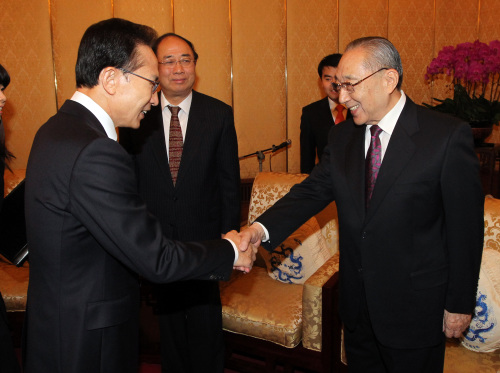S. Korea, China to strengthen high-level diplomatic channels
By Korea HeraldPublished : Jan. 10, 2012 - 19:08
Joint statement stresses bilateral free trade pact will serve mutual interest
BEIJING ― South Korea and China on Tuesday agreed to strengthen bilateral communication by activating a telephone hotline between their foreign ministers and other high-level diplomatic channels, so as to boost diplomatic cooperation.
In a joint press statement, they also reiterated the early conclusion of the bilateral free trade pact would serve their mutual interests, underscoring joint efforts to achieve a 2015 goal of reaching $300 billion in its two way trade volume.
Seoul announced on Monday that it has decided to start taking “domestic steps” needed to initiate official negotiations over a FTA with China, saying the local procedures will be completed within one or two months.
The statement was issued on the second day of President Lee Myung-bak’s three-day state visit to Beijing, which included talks with Chinese President Hu Jintao on Monday and Premier Wen Jiabo on Tuesday.
The issue over bilateral communication was raised recently after critics argued that Seoul and Being appeared to lack sufficient communication following the death of North Korean leader Kim Jong-il.
BEIJING ― South Korea and China on Tuesday agreed to strengthen bilateral communication by activating a telephone hotline between their foreign ministers and other high-level diplomatic channels, so as to boost diplomatic cooperation.
In a joint press statement, they also reiterated the early conclusion of the bilateral free trade pact would serve their mutual interests, underscoring joint efforts to achieve a 2015 goal of reaching $300 billion in its two way trade volume.
Seoul announced on Monday that it has decided to start taking “domestic steps” needed to initiate official negotiations over a FTA with China, saying the local procedures will be completed within one or two months.
The statement was issued on the second day of President Lee Myung-bak’s three-day state visit to Beijing, which included talks with Chinese President Hu Jintao on Monday and Premier Wen Jiabo on Tuesday.
The issue over bilateral communication was raised recently after critics argued that Seoul and Being appeared to lack sufficient communication following the death of North Korean leader Kim Jong-il.

The minister-level hotline was established in 2005, but has not been actively used, possibly because the two sides differed over their approaches regarding North Korean issues.
“The two sides agreed to expand common interests by reinforcing communication and coordination through strengthened exchanges among their governments, parliaments and political parties,” the statement said.
The two countries also underscored the need to quickly forge conditions to restart the six-party talks for North Korea’s denuclearization. The talks, which have been stalled since 2009, involve the two Koreas, the U.S., Japan, China and Russia.
“The two sides decided to make joint efforts with concerned parties and international society to create conditions for an early resumption of the six-party talks,” it said.
What drew attention in the statement is a paragraph that hinted at subtle differences over how to resolve North Korean issues. It exposed only China’s position, while the other sentences showed their “common” position.
“The Chinese side restated that ultimately, it supports the Korean Peninsula’s peaceful reunification after the two Koreas improve their relations through dialogue and negotiations and seek reconciliation and cooperation,” it said.
Seoul and the U.S. have called on the North to show a “sincere” attitude and take preliminary denuclearization steps first, which include suspending its uranium enrichment program, while China and the North want to quickly resume the talks.
The statement also restated peace and stability on the Korean Peninsula and in the region will serve their “common interests.”
China seeks regional stability as a possible instability in North Korea could undermine its national interests, analysts said. Seoul also seeks stability in the North as the reclusive state is striving to stabilize itself under the leadership of Kim’s heir Jong-un.
Seoul and Beijing also agreed to continue to seek negotiations on setting a clear maritime boundary in apparent efforts to address issues surrounding Chinese fishermen illegally operating in South Korean waters.
Public sentiment against China has worsened in South Korea since a South Korean Coast Guard officer was stabbed to death by an illegal Chinese fisherman last month.
“The two sides agreed to strengthen existing bilateral cooperative systems, and communication and cooperation, so as to smoothly address issues concerning the fishing industry, jointly protect the fishing order and for the sustainable development of fishery resources,” the statement said.
In the statement, Seoul said it would continue to uphold the “One China Policy” with regard to issues concerning the China-Taiwan relations.
The two countries also “highly evaluated” bilateral cooperation that has improved in political, economic, social and cultural exchanges since they agreed in 2008 to elevate their ties to a strategic partnership.
During his stay here, President Lee also met with other top Chinese officials and Chinese and South Korean businesspeople. He is to return home on Wednesday.
By Song Sang-ho, Korea Herald correspondent
(sshluck@heraldcorp.com)
-
Articles by Korea Herald



















